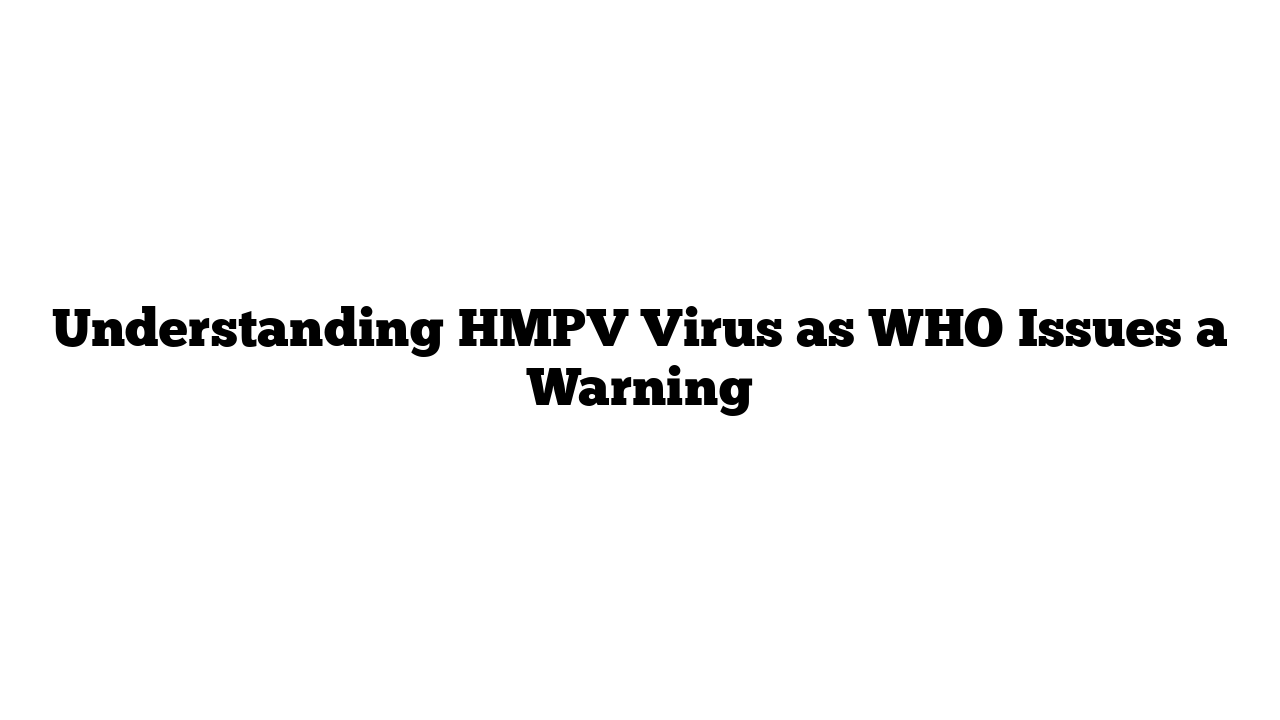What is the HMPV Virus?
Human Metapneumovirus (HMPV) is a respiratory virus that affects people of all ages but is particularly concerning for young children, older adults, and those with weakened immune systems. Recently, the World Health Organization (WHO) issued a warning about HMPV due to its increasing prevalence and potential to cause severe respiratory illness.
Key Facts About HMPV
Discovery and Background
HMPV was first identified in 2001 by Dutch scientists, but researchers believe it has been circulating in humans for over 50 years. Despite its similarity to other respiratory viruses like RSV (Respiratory Syncytial Virus), HMPV remains less well-known.
Who is at Risk?
HMPV can infect anyone, but certain groups are more vulnerable, including:
- Children under 5 years old.
- Adults over 65 years old.
- Individuals with chronic health conditions such as asthma, COPD, or heart disease.
- Immunocompromised patients, including those undergoing chemotherapy or organ transplants.
Symptoms of HMPV Infection
The symptoms of HMPV often mimic those of a common cold or flu, making it difficult to distinguish without testing. Common symptoms include:
- Fever
- Cough
- Nasal congestion
- Shortness of breath
- Wheezing
- Fatigue
In severe cases, it can lead to bronchiolitis, pneumonia, and even hospitalization.
How is HMPV Transmitted?
HMPV spreads through:
- Respiratory droplets when an infected person coughs or sneezes.
- Direct contact with contaminated surfaces or objects.
- Close contact, such as hugging or shaking hands with an infected individual.
The virus is highly contagious, especially in crowded settings like schools, daycare centers, and nursing homes.
Why Did WHO Issue a Warning?
The WHO has raised concerns about HMPV due to:
- Increased Cases Worldwide
Surveillance data from countries, including the USA, shows a significant rise in HMPV infections, particularly during the winter and spring months. - Lack of Awareness
Many people remain unaware of HMPV, leading to delayed diagnosis and treatment. - No Specific Vaccine or Treatment
Unlike RSV or the flu, there is no vaccine or antiviral treatment specifically for HMPV, making prevention crucial.
Prevention Tips for HMPV
Practice Good Hygiene
- Wash hands frequently with soap and water for at least 20 seconds.
- Use hand sanitizers when soap is unavailable.
- Avoid touching your face, especially the eyes, nose, and mouth.
Disinfect Surfaces
Clean frequently touched objects like door handles, toys, and electronic devices with disinfectant wipes.
Avoid Close Contact
If you or someone you know is feeling unwell, avoid close interactions and maintain physical distance when possible.
HMPV vs. Other Respiratory Viruses
HMPV vs. RSV
Both viruses cause similar symptoms, but RSV is more widely studied and has a vaccine available for high-risk individuals.
HMPV vs. Influenza
While flu vaccines and antiviral treatments exist, HMPV currently lacks specific medical interventions.
What to Do If You Suspect HMPV?
Seek Medical Advice
If symptoms worsen or persist, consult a healthcare provider. They may recommend tests to confirm the diagnosis.
Supportive Care
Treatment focuses on relieving symptoms. Common approaches include:
- Rest and hydration.
- Over-the-counter medications for fever and pain.
- Use of humidifiers to ease breathing.
Research and Future Directions
Vaccine Development
Efforts are underway to develop an HMPV vaccine, but it may take years before it becomes widely available.
Awareness Campaigns
Organizations like the WHO and CDC aim to raise awareness about HMPV to ensure timely diagnosis and better preventive measures.
Trusted Resources for More Information
For in-depth explanations and expert tips, visit medicaltimes.io. Check out these additional trusted sites:
- Centers for Disease Control and Prevention (CDC) (cdc.gov)
- World Health Organization (WHO) (who.int)
- Johns Hopkins Medicine (hopkinsmedicine.org)
FAQs: Frequently Asked Questions
1. What is HMPV?
HMPV stands for Human Metapneumovirus, a respiratory virus that can cause mild to severe illness.
2. How is HMPV different from the flu?
HMPV lacks specific vaccines or treatments, unlike the flu, which has preventive and therapeutic options.
3. Who is most at risk for HMPV?
Young children, older adults, and immunocompromised individuals are most vulnerable.
4. Can HMPV cause severe complications?
Yes, it can lead to pneumonia, bronchiolitis, and hospitalization in severe cases.
5. Is there a vaccine for HMPV?
Currently, no vaccine is available for HMPV.
6. How can I protect myself from HMPV?
Good hygiene, avoiding close contact with sick individuals, and disinfecting surfaces are key preventive measures.
7. What should I do if I suspect HMPV?
Consult a doctor if symptoms worsen or persist. Supportive care can help manage symptoms.
8. Is HMPV common in the USA?
Yes, HMPV cases are rising in the USA, especially during colder months.
9. How is HMPV diagnosed?
Diagnosis typically involves nasal or throat swabs tested in a lab.
10. Can healthy individuals recover from HMPV without treatment?
Yes, most healthy people recover with rest and supportive care.
